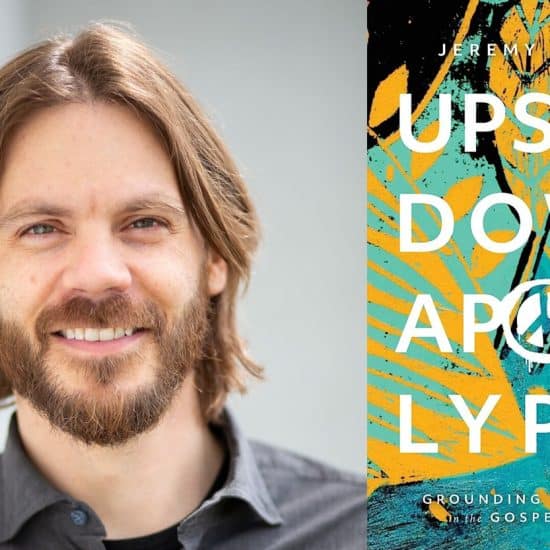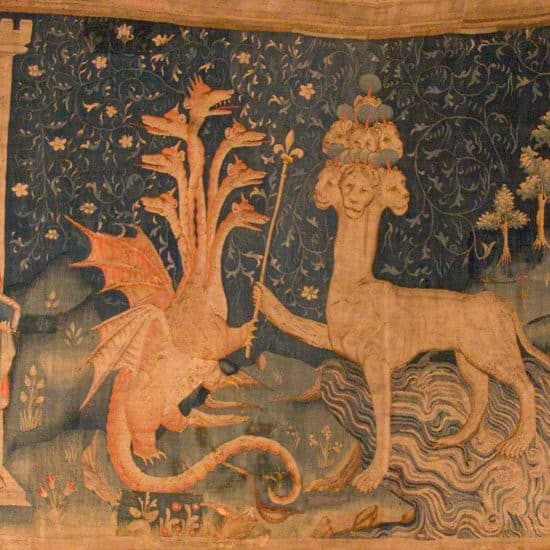 The Water of Life
The Water of Life
Formations: November 24, 2019
Scripture: Revelation 7:9-17

Michael K Olmsted
How do you read Revelation? As a timetable? Or, a riddle with hidden passwords and secret symbols? What if it is instead spiritual poetry, a celebration of something so marvelous words are simply inadequate to explain the promise of God?
John was the last of Jesus’ twelve apostles living in the AD 90s, a period marked by terrible persecution of Christians, viewed as enemies of the pagan gods and a threat to the dominant Roman government. For 30 years, the Christians were hunted down and killed. John was exiled by the government to the island of Patmos, where he saw a vision of God’s ultimate victory over evil and the celebration of God’s love and grace in eternity.
This conclusive vision of God’s will is written in language and imagery of the first century. Given the various modern theological theories and imaginative interpretations of Revelation, we do best approaching it as being about the sovereignty of God and a heaven that cannot be reduced to streets of gold and mansions.
Our text opens with the spectacle of God on his throne, with “a great multitude that no one can count, from every nation, from all tribes and people and languages standing before the throne and before the Lamb, robed in white, with palm branches in their hands … saying, ‘Salvation belongs to our God who is seated on the throne, and to the Lamb’ (vv. 9-10). John writes to a church ravaged by years of persecution, a people trying to remain faithful to God while remembering the encouraging words of spiritual mentors like the Apostle Paul: “To be absent from the body is to be present with the Lord” (2 Corinthians 5:8), and it is written “What no eye has seen, nor ear heard, not the human heart conceived, what God has prepared for those who love him” (1 Corinthians 12:9).
Again, Paul’s words encourage: “I consider that the sufferings of this present time are not worth comparing with the glory about to be revealed to us” (Romans 8:18). The human perspective looks for the concrete, the familiar, the symbols of success and blessing, but if the concept of God’s love and grace displayed on the cross is hard for us to grasp, then the glories of heaven are well beyond definition.
The elderly John, isolated from other believers, witness to the incredible suffering of the church and threatened by the cruel power of Caesar, is tasked with a new portrayal of God’s grace and ultimate hope. This is apocalyptic literature; that is, a figurative, mystical vision of a spiritual place no one has the ability to fully interpret. What he records is a vision of God’s redeemed people, a great multitude beyond counting, from all peoples, tribes, and languages, wearing white robes and carrying palm branches (v. 9).
The first characteristic is there is no distinction or division among those celebrating: no Jew or Gentile, no Roman or Greek, no black or white, no rich or poor, no … well, you get the idea. The grace of God recognizes no divisions within humanity. The grace of God is a gift to anyone who opens their heart and life to God.
They are dressed in white robes, a simple symbol that God’s grace has washed away their sins and they are now dressed for the wedding of the church universal and her bridegroom, the Christ. They hold palm branches, a symbol of victory, for this is the great day when all of creation will stand before the throne of God who is victor over evil, no matter what form it takes. All of heaven is gathered, crying out “Salvation belongs to our God who is seated on the throne, and to the Lamb” (v. 10).

Image by congerdesign from Pixabay
Repeatedly, John points to the victory of God’s grace: “These are they who have come out of the great ordeal; they have washed their robes and made them white in the blood of the Lamb … they worship God day and night within his temple … the one on the throne will shelter them … no more hunger … no more thirst … the sun will no longer scorch them” – in other words, God’s people will be home forever! (vv. 15-17). But there is even more!
People have often asked me what heaven is like. I cannot say because I have not seen it, but I understand through John’s limited words that heaven exceeds anything we know. Surely it is enough to know that in God’s heaven the Lamb (Jesus) will be our shepherd, “guiding us to springs of the water of life, and God will wipe away every tear from our eyes” (v. 17).
Recently I listened to the remembrances of a holocaust survivor, a heart-rending story of brutality and death. She has lived, sustained by God’s love and the understanding that heaven will heal the tragedy and reunite her with loved ones.
I have also heard the testimony of a Colombian woman who experienced persecution as a young child because of her faith in Christ, but now worships openly in a believers’ church and shares Christ freely with her neighbors. She looks forward to that day when she will be part of that great crowd from all the nations singing before the throne of God.
Heaven is not that place where we get the big house and the wealth of Solomon. Heaven is that place where we will live in the healing, nurture, and undimmed beauty of God’s love. In Jesus we see the grace of God displayed against the selfishness and evil this world offers. The Apostle John lived in a world of suffering, violence, prejudice, and despair, but he could see beyond the darkness, the isolation of his island exile, and the suffering of the early church to the “springs of the water of life” where God has prepared a place for us. May we choose to live, not focused on the glories of heaven, but dedicated to share the love of God in Christ, which is the promise of heaven.
Formations is a curriculum series from Smyth & Helwys Publishing, Inc. through NextSunday Resources.
The PDF download requires the free Acrobat Reader program. It can be downloaded and installed at https://get.adobe.com/reader (uncheck optional offers first).




